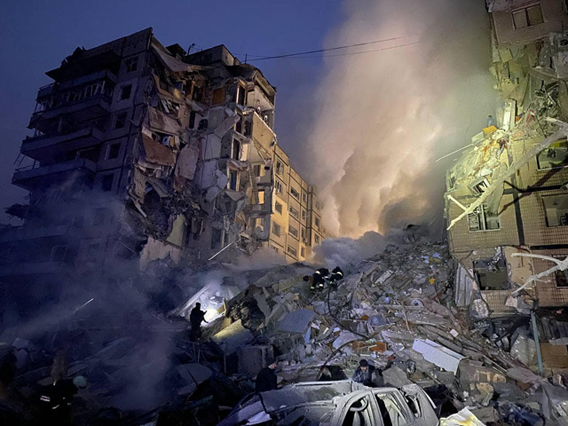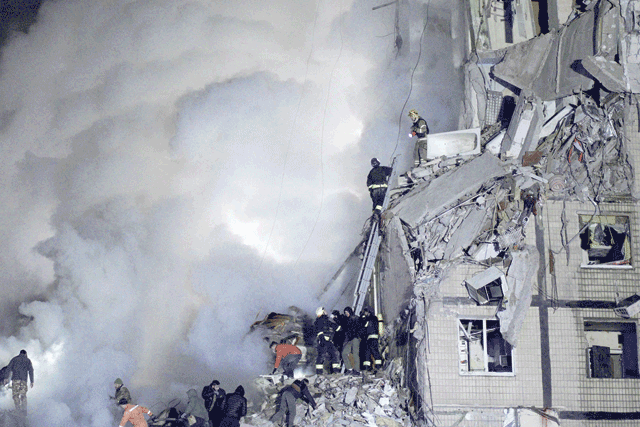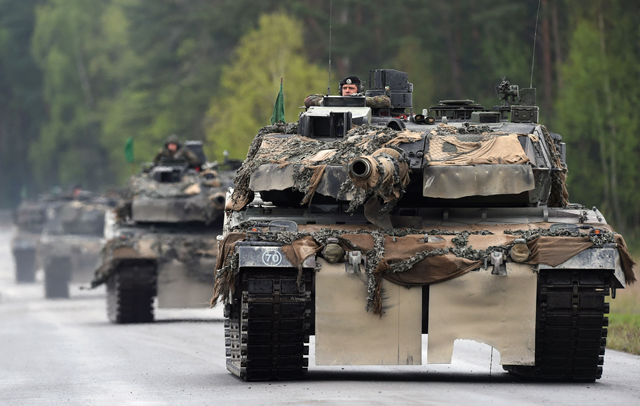You are here
UK sending heavy tanks to Ukraine, prompts Russian warning
By AFP - Jan 14,2023 - Last updated at Jan 14,2023

This handout photo taken and released by the Ukrainian Emergency Service on Saturday shows rescuers working on a residential building destroyed after a missile strike in Dnipro (AFP photo/Ukrainian Emergency Service)
LONDON/ISTANBUL — British Prime Minister Rishi Sunak on Saturday pledged to provide Challenger 2 tanks to Ukraine, making it the first Western country to supply the heavy tanks Kyiv has been calling for.
The pledge saw a swift reaction from Russia which warned it would only "intensify" the conflict.
"Bringing tanks to the conflict zone, far from drawing the hostilities to a close, will only serve to intensify combat operations, generating more casualties, including among the civilian population", the Russian embassy in the UK said.
Sunak said the tanks were a sign of the UK's "ambition to intensify our support to Ukraine", according to a readout of a phone call with Ukrainian President Volodymyr Zelensky.
Ukraine's European allies have sent Kyiv more than 300 modernised Soviet tanks since Russia invaded in February 2022.
But they have so far held off on dispatching the Western-made heavy tanks that Ukraine has repeatedly requested to push forward against Russian invaders.
Zelensky thanked the UK on Twitter for making decisions that "will not only strengthen us on the battlefield, but also send the right signal to other partners".
Heavy losses
Ukraine's forces have taken heavy losses in the battles of Soledar and Bakhmut in recent months and have called on the country's allies to give it more
support.
Russia said on Friday its forces had wrested control of the war-scarred town of Soledar in east Ukraine, its first claim of victory in months of battlefield setbacks, although Ukraine said fierce fighting was still under way.
“To win this war, we need more military equipment, heavy equipment,” Andriy Yermak, head of Ukraine’s presidential office, said.
Foreign Minister Dmytro Kuleba also said that he had spoken with US Secretary of State Antony Blinken and “emphasised the need” for Ukraine to receive Western-type tanks.
Sunak’s formal offer follows reports that he was preparing to sign off on sending four British Army Challenger 2 main battle tanks to eastern Europe immediately, with eight more to follow shortly afterwards.
The prime minister’s office has not yet confirmed the exact number of tanks it will send to Kyiv.
Seize the moment
A Downing Street spokesman said Sunak and Zelensky agreed on the “need to seize on this moment” after Ukrainian victories had “pushed Russian troops back”.
“The Prime Minister outlined the UK’s ambition to intensify our support to Ukraine, including through the provision of Challenger 2 tanks and additional artillery systems,” the spokesman said.
The issue of heavy tanks has long been a key one for Kyiv and many experts see providing Ukraine with modern tanks as a vital building block in its ability to win against Russia.
Germany has been especially hesitant of supplying heavy tanks.
It has delivered powerful mobile artillery and air defences but remains fearful of an escalation with Moscow if its tanks face off directly against their Russian opposite numbers.
The Downing Street spokesman added that Sunak and Zelensky “welcomed other international commitments including Poland’s offer to provide a company of Leopard tanks”.
“The Prime Minister stressed that he and the whole UK Government would be working intensively with international partners to deliver rapidly the kind of support which will allow Ukraine to press their advantage, win this war and secure a lasting peace,” he said.
The UK announcement comes ahead of next week’s meeting of the Ukraine Defence Contact Group, which coordinates arms supplies to Kyiv, at Ramstein Air Base in Germany.
Meanwhile, Turkey said Saturday it was ready to push for local ceasefires in Ukraine and warned that neither Moscow nor Kyiv had the military means to “win the war”.
The proposal from President Recep Tayyip Erdogan’s top foreign policy adviser represented NATO member Turkey’s latest effort to use its good relations with both Moscow and Kyiv to try and end Europe’s bloodiest conflict since World War II.
Turkey hosted two early rounds of peace negotiations and helped strike a UN-backed agreement restoring Ukrainian grain deliveries across the Black Sea.
Erdogan has also held repeated rounds of phone consultations with Russian President Vladimir Putin and Ukrainian leader Volodymyr Zelensky aimed at finding common ground.
Erdogan’s foreign policy adviser Ibrahim Kalin told reporters that the warring sides were unlikely to strike an “overarching peace deal” in the coming months.
Related Articles
KYIV — Ukraine said Sunday that the death toll had risen to 21 after a Russian missile slammed into a tower block in the city of Dnipro duri
BERLIN — Berlin on Wednesday approved the delivery of powerful German-made Leopard tanks to help Ukraine repel Russia's invasion, after week
SOLEDAR, Ukraine — Ukraine looked close to losing the key eastern city of Severodonetsk to Russian forces but was boosted Wednesday by the U



















